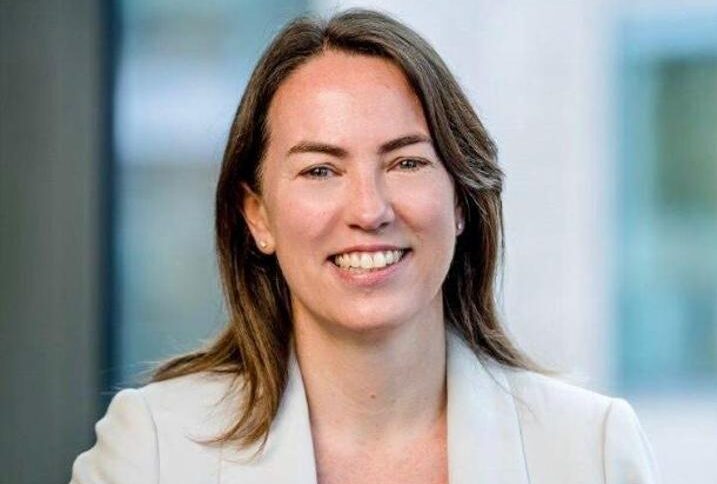I met Laura Brooks when she was the Group Head Sustainability Integration and Impact for Anglo American, when doing interviews for my Harvard Business Review article with Alison Taylor about the evolving role of the CSO. She recently left Anglo American to pursue new challenges. I asked her if she’d be willing to talk with me to reflect on what she learned from her time at Anglo American and she kindly agreed.
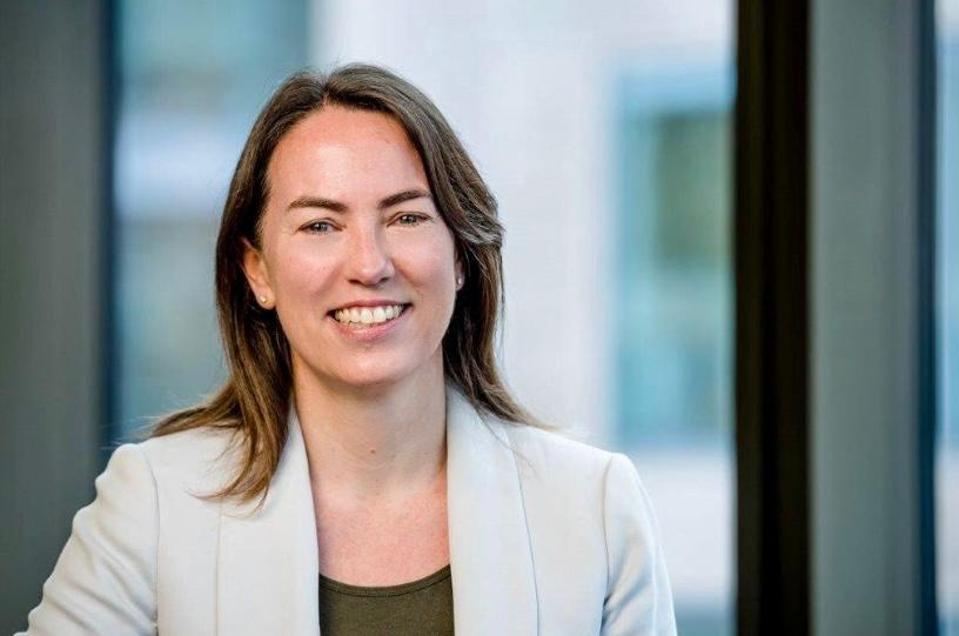
Laura Brooks
Eccles: Hi, Laura, thanks for taking the time to talk with me. I’ve never asked you about your childhood. Mind telling me a bit about it?
Brooks: I was born in the UK and my father was in the military so we had a very nomadic upbringing, moving every few years with his postings. When I was 10 years old, we moved to California and I lived in the U.S.A] before returning to the UK for postgraduate study.
Eccles: How did this upbringing shape your world view and outlook?
Brooks: I was acutely aware of politics from a young age and my dream job was to become a news reader. After moving from school to school, I was eventually sent to a Quaker boarding school. As you may be aware, Quakers focus on principles like equality and justice, and established a significant number of responsible businesses in the 1800s. It was at this school that I joined Amnesty International and became interested in human rights. I then went on to study Political Science at Barnard College, Columbia University in New York. During this time in New York, I was privileged to intern at organisations focusing on human rights such as UNICEF.
Eccles: What was your first job out of college and what did you do?
Brooks: After university, I started working at a non-profit in New York called Institute for International Education. As an entry level role, it was somewhat administrative, and I decided to start an M.Sc. in Comparative Politics at the London School of Economics (LSE). Whilst studying at the LSE, the Rwandan genocide had just ended and the International Criminal Tribunal for Rwanda was being established in Arusha, Tanzania. I was burning to get some first-hand experience and headed to Arusha to get a job at the tribunal. Naively, I printed 50 copies of my CV and bought a plane ticket to Nairobi, then took a very long bus ride to Arusha. Not unsurprisingly, the tribunal needed lawyers rather than social scientists. Not one to be discouraged, I headed to Dar Es Salaam and managed to get a job working in the Rwandan refugee camps, first with the Tanzanian Red Cross and then with Care Tanzania.

Mogadishu,Somalia-April, 30, 2013 :A general view of the tent camp where thousands of Somali immigrants on April 30, 2013, in Mogadishu,Somalia. (Photo: iStock)
Eccles: That must have been a very daunting experience so early in your career! What was it like?
Brooks: It was daunting but equally rewarding. I was working on HIV/AIDS interventions and conducting social and environmental impact assessments of the refugee camps on host communities. Despite the horrific experiences of the genocide and then fleeing to refugee camps where the social fabric of life was more or less dissolved, many of the refugees in the camps demonstrated so much humility, dignity, and hope. Throughout my career, it has served as a very grounding experience and provided me with perspective. One takeaway from my work in the refugee camps is that small acts of kindness can make an enormous difference.
Eccles: What did you do after working in the refugee camps?
Brooks: I returned to London to finish my M.Sc. and then started working at Scotiabank to develop policies and procedures for the incoming transfer pricing regulations across their European operations. It was an interesting transition from refugee camps to a bank in London.
Eccles: That sounds like an awfully big shift! Was this really what you wanted to do with your life?
Brooks: Yes, it was, and, no, it wasn’t. After two years, I decided to leave the world of transfer pricing. It was at this time, in the late 1990s, that the responsible sourcing team from the Body Shop International joined KPMG to establish consultancy services to advise corporates on sustainability. Given my combination of non-profit and commercial experience, I thought this sounded interesting and joined KPMG’s sustainability team. At KPMG, I started working with companies in a range of sectors on their sustainability programmes. At the time, it was pioneering work.
Eccles: What did you enjoy about the work?
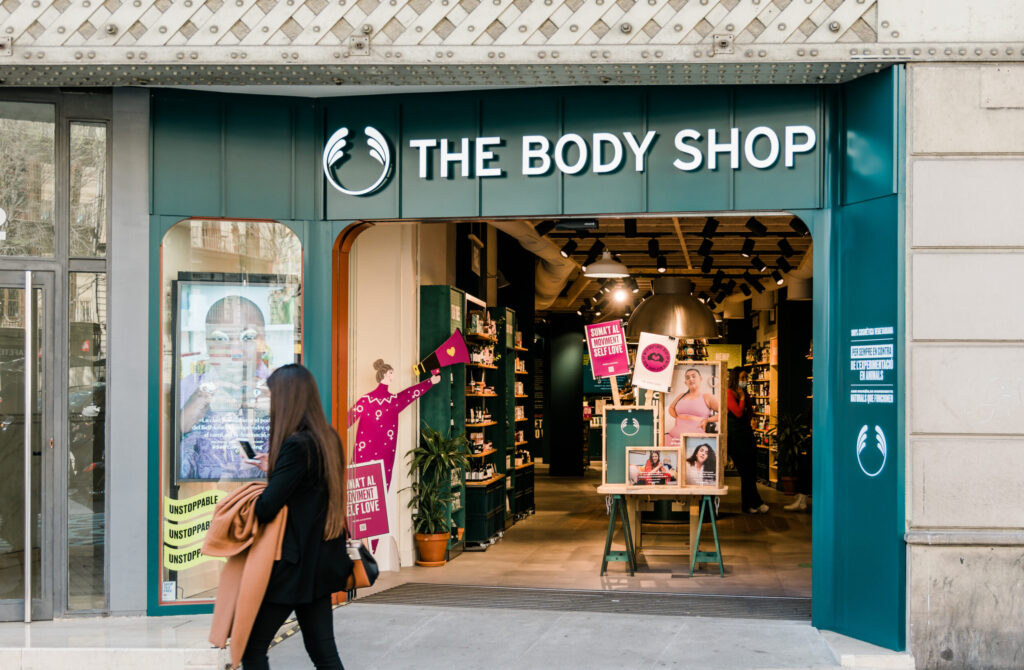
Badalona, Barcelona, Spain – April 3, 2021. Logo and facade of The Body Shop, is a British company of cosmetics, skin care and perfumes. (Photo: iStock)
Brooks: So much! It felt rewarding to work with businesses that had such a significant impact on a range of stakeholders – whether local communities, suppliers, investors, customers, or employees. I was privileged to work with companies like the Body Shop that were purpose-driven advocates for human rights to companies with business-critical issues like oil and gas companies in Nigeria operating in complex environments.
Eccles: Were there any sustainability issues that you found particularly interesting?
Brooks: So many issues were interesting given the range of sectors that we worked with. In particular, I spent a lot of time with companies in the Niger Delta and would hear communities say “Chevron is the only government we know” or “Shell is the only government we know.” This was at a time when companies were being seen to be too powerful and invasive in public life. I decided it would be a great topic for a Ph.D. So I returned to the LSE and completed my Ph.D. whilst continuing to work at KPMG.
Eccles: When did you join Anglo American and in what role?
Brooks: I joined Anglo American’s social performance team in 2010. As a global, diversified mining company with operations in a range of countries, this was an exciting opportunity to ensure that the negative impacts of mining are mitigated and positive impacts are delivered. Over time, I worked my way up to Head of Social Performance for the group.
Eccles: What are the impacts of the mining industry? Isn’t it inherently unsustainable?
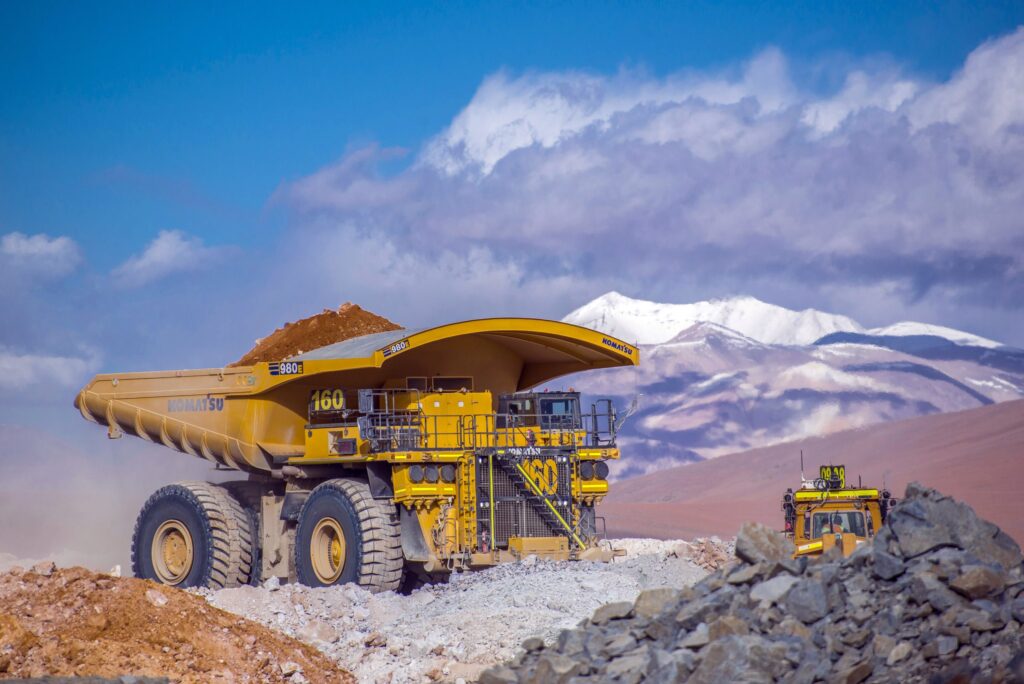
“Collahuasi trucks” by Anglo American
Brooks: From my perspective, there is a lack of awareness of the critical role that metals and minerals play in society as well as driving the transition to a low-carbon economy. In order to drive a sustainable future, these metals and minerals must be mined in a responsible way and demonstrate a value for society. The mining sector needs to better articulate the value of its products to society and criticality to the energy transition alongside its operational impacts.
Eccles: How has Anglo American done this?
Brooks: In 2018, Anglo American launched its Sustainable Mining Plan that sets out deliberately ambitious environmental (e.g., climate change, biodiversity, and water), social (e.g., community education, health, and livelihoods) and governance (e.g., accountability, policy advocacy and mine certification) commitments for 2030. These commitments focus on mitigating the negative operational impacts and driving positive impacts. I was asked to lead the implementation of the Sustainable Mining Plan across a complex organisation of approximately 100,000 people in a range of geographies and commodities.
Eccles: How did you go about this work given the complexity of the organisation?
Brooks: It was a new role in the company. My first steps were to develop a 100-day plan and hire a team. I knew that building the right team would be critical—the entry requirement was a solid foundation in sustainability—but equally I was looking for effective influencing skills in order to drive change. I recruited a range of internal environmental, social, and governance experts from different geographies. The team was incredibly diverse.
Eccles: Once you had the team in place, how did you drive the programme?
Brooks: The programme was broadly designed and delivered in three phases that I referred to as infiltrate, embed, and evolve. The first phase, “infiltrate,” built awareness of sustainability and focused on developing an initial “plan-for-a-plan’” across every nook-and-cranny of the organisation. The second phase focused on “embedding’”sustainability into organisational planning and management systems; this makes sustainability part of every day decision making alongside the delivery of long-term goals. Given how quickly sustainability expectations have evolved since the launch of the Sustainable Mining Plan in 2018, the third phase focused on “evolving” the sustainability commitments to ensure that they remain relevant and appropriate in order to continue to set direction for organisation on sustainability.

Year 2025 written on a paper with a green pushpin, concept image for business vision or long term prospective. Number two thousand twenty five. (Photo: iStock)
Eccles: What makes sustainability different from other business issues?
Brooks: Sustainability commitments are by their very nature long-term. We see companies in all sectors making sustainability commitments for 2030/2040/2050. Conversely, we rarely see companies making such long-range financial or production commitments. Additionally, sustainability issues are interdependent and complex and are also located within systems. We cannot tackle single-sustainability issues in isolation. We need to understand the first, second, and third order consequences, in terms of both risks and opportunities.
Eccles: What is required to do this?
Brooks: An abundance of long-term, systems thinking is required to deliver on sustainability commitments. This is what makes working in sustainability exciting. It requires extensive collaboration with a range of internal and external stakeholders as well as broad systems thinking.
Eccles: How should companies shape their sustainability commitments?
Brooks: First and foremost, you need to understand the business and its stakeholders. This means understanding the organisational purpose and strategic priorities, as well as the impacts of the products and services on society and the environment. In many cases, we see companies that are focusing on their operational performance and impacts and not the impacts of their products and services. In parallel, you need to understand your stakeholders and operating context. I’ve been working with businesses on sustainability since the 1990s and have seen both the internal and external context change rapidly. Sustainability commitments should reflect both the internal and external priorities for the business.
Eccles: What advice do you have about driving the delivery of the sustainability commitments across large and complex organisations? What is your playbook?

Teamwork concept with building puzzle. People working together with giant puzzle elements. Symbol of partnership and collaboration. Flat vector illustration isolated on white background. (Photo: iStock)
Brooks: There are some key building blocks. Primarily, you need to build an understanding of how a company operates and breathes including its culture and leadership. Second, you need to develop an in-depth understanding of how strategic priorities are executed on the ground and establish delivery pathways. Third, you need sophisticated and robust organisational planning and budgeting processes. As a team, we worked closely with the operating assets to embed sustainability into their asset-level plans and budgets as well as the Group Functions (from Strategy to Human Resources to Technical functions) to embed sustainability into their day-to-day decision making whether its capital allocation or reward criteria. This means that sustainability isn’t a silo in the organisation and also that its everyone’s responsibility not just the relatively small group of sustainability experts in the business.
Eccles: You mentioned culture and leadership, why is that important for sustainability?
Brooks: This is critical for organisational change. I always use the example of JFK visiting NASA during the 1960s. During his tour of the space centre, he asked a janitor about his job and the janitor replied that he was helping to put a man on the moon. This provides a great example of purpose when every single person within an organisation is pointing in the same direction. It also demonstrates that no matter what your role is in an organisation or company—whether you’re an accountant in the Finance team or a Human Resources professional—you also have a role to play in contributing to the sustainability.
Eccles: How did you leverage culture and leadership to drive sustainability at Anglo American?
Brooks: In a number of ways. The company leadership fully understood the strategic importance of sustainability and ultimately made my job easy. With the senior leadership, we organised calls attended by thousands of employees to talk about sustainability and asked them each to articulate why sustainability was personally important to them. I also led sustainability leadership development modules with our General Managers to increase their awareness and knowledge of sustainability. The General Managers are the most senior leaders at each operating asset in Australia, Botswana, Brazil, Canada, Chile, Namibia, Peru, South Africa and Zimbabwe. As I mentioned, we also embedded sustainability into organisational planning and management systems so that it became part and parcel of the way the company does business and the way the company makes decisions, from scorecards to budgeting. We also established communities of practice to ensure that lessons were shared across the organisation. At the individual level, it is really about understanding people, their motivations, and what influences them.
Eccles: You’ve been working with businesses on sustainability for almost a quarter of a century. What are your reflections?
Brooks: At the beginning of my career you often had to justify having a seat at the table. It was sometimes a battle to get your voice heard and sustainability was treated as a risk or after thought. In the last five years, we have seen a seismic shift change in the way that a range of stakeholders view the importance of sustainability. This includes commercially focused stakeholders like investors and customers. As a result, sustainability is increasingly seen as business critical and its no longer necessary to argue for a seat at the table. Now, sustainability is more central to strategy and decision making. It is seen as a strategic differentiator.
Eccles: In your view, how do you establish effective internal control over sustainability?
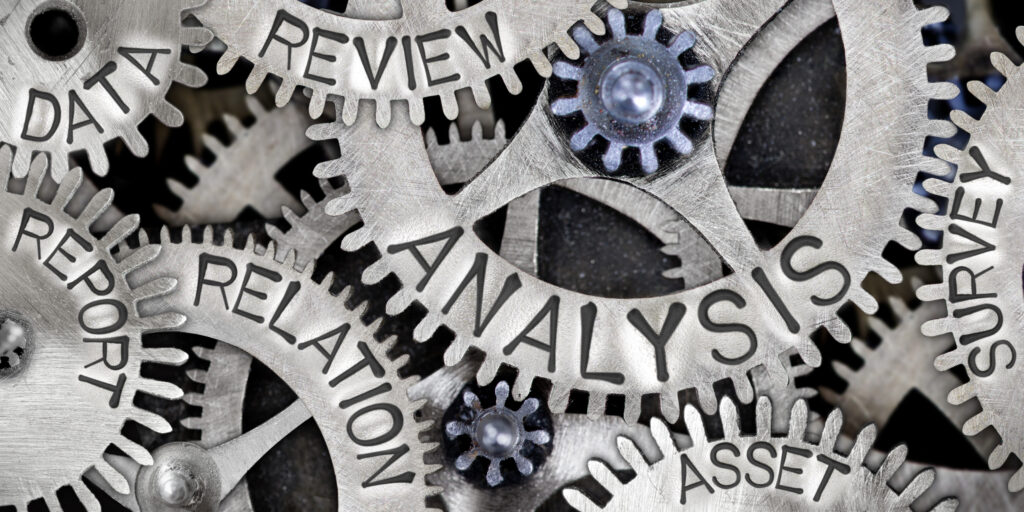
Macro photo of tooth wheel mechanism with ANALYSIS, RELATION, DATA, REVIEW, ASSET, REPORT and SURVEY words imprinted on metal surface. (Photo: iStock)
Brooks: Long-term sustainability commitments often have complex and interdependent delivery pathways. These pathways need to be defined and the risks and opportunities along these pathways need to be identified, assessed, and managed. This requires a comprehensive internal control environment that is planned, budgeted, executed, and reviewed with performance metrics that give you a sense of whether delivery is on track or off track. Whilst there is often a focus on reporting sustainability data (typically backward looking in nature) and assurance over this data, there is an equal need to establish confidence in forward looking sustainability pathways. COSO has recently released it Integrated Framework for Achieving Effective Internal Control over Sustainability Reporting (ICSR) and this sets out guidance for the control over the forward-looking performance and reporting. At Anglo American, we worked hand-in-hand with our internal audit team to assess the control environment for our long-term sustainability commitments. It was a really important partnership to drive sustainability performance inside the business.
Eccles: One more question, now that you’ve left Anglo American what are you going to be doing with your time?
Brooks: I really struggle to sit still. Whilst I’m exploring new challenges, I’m also taking the opportunity to spend time with my kids who have just finished their GCSE and A-level exams in the UK. I’ve started the Sustainable Business Strategy course at Harvard Business School Online. I also recently started lifting weights and will try to improve my personal best over the summer.
Eccles: I’m 72 and I started lifting weights when I was 60. So I have years of experience on you and I’m a guy but you’re a lot younger. I’ll give you a few years to get in shape and then we’ll do a weight, age, and gender-adjusted comparison to see who’s stronger!
Brooks: Happy to do that, Bob. But I’m already sure you’ll win.
Eccles: Let’s see! Thanks again for your time and all the best in whatever you decide to do next. I hope we can keep in touch.
SUBSCRIBE TO OUR NEWSLETTER
Subscribe our newsletter to receive the latest news, articles and exclusive podcasts every week


